May 23, 2025 | 10:43 GMT +7
May 23, 2025 | 10:43 GMT +7
Hotline: 0913.378.918
May 23, 2025 | 10:43 GMT +7
Hotline: 0913.378.918

Minister Le Minh Hoan and Minister Nguyen Hong Dien chaired the conference. Photo: C.Dung.
The conference to discuss solutions to remove difficulties in the production and export of rice, vegetables, and fruits took place on May 28 at the headquarters of the Ministry of Industry and Trade. The conference aims to evaluate the export situation of rice, vegetables, and fruits in the first 4 months of 2024 and discuss solutions to remove difficulties and promote exports in the last months of the year.
Minister of Industry and Trade Nguyen Hong Dien assessed that Vietnam's production and export of rice, vegetables, and fruits at the end of 2023 and in the first months of 2024 were quite favorable and achieved many positive results, increasing both in quantity and value.
Associations and businesses have effectively exploited traditional markets and opened up many new and potential markets. Vietnam's brands of rice and many vegetable and fruit products continue to be affirmed in the international market. Many businesses and producers have better approached and exploited the advantages of FTAs in which Vietnam is a member.
However, production and export activities of agro-products still have limitations: the development of some growing areas is too "hot" in scale but does not comply with the process of ensuring quality standards; Production and export businesses have not carefully researched the requirements and signals of the export market, so their product brand cannot be affirmed. Export businesses participate in bidding for large shipments into key markets, but the prices are much lower than those of other partners (even lower than domestically). Besides, at some times the selling price is too high while the quality is not commensurate.

Minister Nguyen Hong Dien spoke at the conference. Photo: C.Dung.
According to forecasts, the world's demand for importing rice, vegetables, and fruits will increase in the coming time due to supply disruptions in many countries (affected by armed conflicts, geopolitical competition, and trade wars). Requirements on product quality will be increasingly higher; many technical barriers have been and are being erected by importing countries to protect domestic trade.
Vietnam is continuing to promote negotiations, signing, and upgrading FTAs with partners in potential markets, creating favorable conditions for businesses to diversify markets, supply chains, and export products, especially in new, potential, but not yet effectively exploited market areas or segments, such as Halal food, African, and Latin American markets. The above factors will have a strong impact on Vietnam's rice, vegetable, and fruit trade activities in the coming time.
According to the Ministry of Industry and Trade, in recent times, the Ministry has proactively implemented synchronous solutions such as negotiating to reduce import tariffs and continuing to negotiate, sign, and upgrade FTAs with partners in potential export markets. Supporting businesses to improve capacity and awareness of the policies and incentives of FTAs; promoting trade promotion activities; and connecting supply and demand for goods. Promoting the role of Vietnamese Trade Offices abroad in grasping and promptly providing information about the market and the new regulations and policies of host countries, helping businesses and state management agencies have appropriate and feasible policy responses.
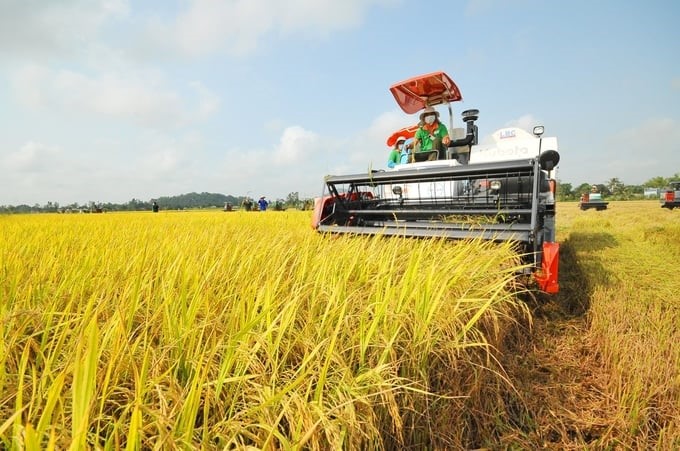
Rice exports will continue to grow from mid-2023, when turnover in the first 4 months of 2024 increased by 57.9% over the same period. Photo: Le Hoang Vu.
According to a report from the Ministry of Agriculture and Rural Development, in the first 4 months of 2024, the total export turnover of agricultural, forestry, and fishery products nationwide is estimated at USD 19.06 billion, an increase of 23.7% over the same period in 2023. The trade surplus value of the entire sector reached USD 4.74 billion, an increase of 71.5%. With this result, the agricultural sector is ready to reach new export records.
Products that have currently achieved an export turnover of more than USD 1 billion include wood and wood products (USD 4.84 billion, up 23.7%); coffee (USD 2.57 billion, up 57.9%); rice (USD 2.08 billion, up 36.5%); vegetables (USD 1.8 billion, up 32.1%); and cashew (USD 1.16 billion, up 21.2%).
Data from the Center for Digital Transformation and Agricultural Statistics shows that in the first 4 months of the year, many agro-products had an average export price highly increasing over the same period, such as rice reaching USD 644/ton, an increase of 22.2%; coffee at USD 3,402/ton, up 49.7%; rubber at USD 1,487/ton, up 6.9%; and pepper at USD 4,214/ton, up 36.4%.
The US, China, and Japan are Vietnam's three largest export markets for agricultural, forestry, and fishery products. Export value to the US market accounts for 20.1%, up 25.7% over the same period in 2023; the Chinese market for 18.9%, up 15.1%; and the Japanese market for 6.9%, up 9.6%.
Right from the first months of the year, the fruit and vegetable industry is on track to achieve the annual export turnover target of reaching a record level of USD 6–6.5 billion. Fruit and vegetable exports to the Chinese market in the first 4 months of the year reached high value, making an important contribution to promoting the industry's outstanding growth. In the first quarter alone, exports to China reached USD 759.4 million, increasing by 32.4% over the same period in 2023 and accounting for 59.1% of the total export value of fruits and vegetables. In addition, fruit and vegetable exports are also promoted to other regions, such as Europe, America, Oceania, and Africa.
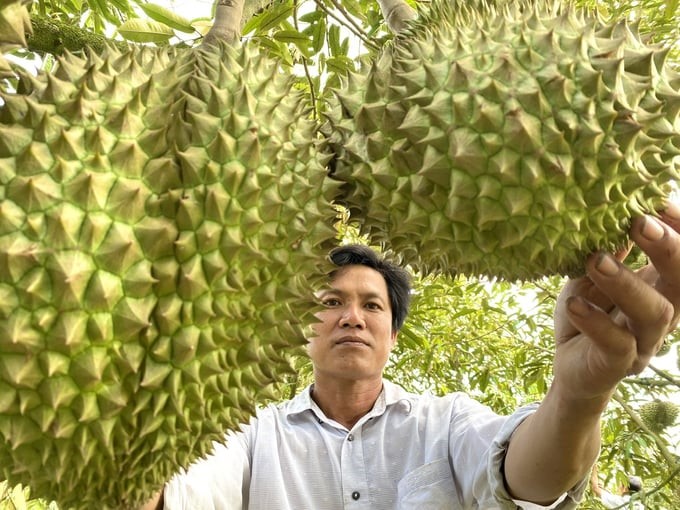
In the first quarter of 2024, fruit and vegetable exports to China reached USD 759.4 million, an increase of 32.4% over the same period in 2023. Photo: Le Hoang Vu.
Vietnam's coffee exports in the second quarter will continue to increase as the world's demand increases highly. Currently, Vietnam's coffee industry is benefiting from a sharp increase in export prices. The International Coffee Organization (ICO) forecasts that coffee consumption in the 2023–2024 crop year will increase by 2.2% compared to the 2022–2023 crop year, reaching 117 million bags. This is an opportunity for the Vietnamese coffee industry to increase exports, aiming to reach more than USD 5 billion in 2024. In the first quarter, tensions in the Red Sea affected about 36% of total global coffee export output, mainly coffee exported from Southeast Asia. However, Vietnam's current coffee export market is still quite open.
Along with vegetables, fruits, and coffee, rice exports will also continue to grow from mid-2023, when turnover in the first 4 months of the year increased by 57.9% over the same period. The selling price of Vietnamese rice is also at a high level, averaging nearly USD 650/ton. On the other hand, the rice export market is also gradually becoming more open, not only focusing on traditional markets such as the Philippines, Indonesia, and Malaysia but also penetrating deeper and deeper into the EU, US, and other Asian markets.
With the goal of reducing production input costs by 20%, the project "Sustainable development of 1 million hectares specializing in high-quality and low-emission rice cultivation associated with green growth in the Mekong Delta until 2030" will contribute to reducing rice production costs for farmer households by about VND 9,500 billion. Besides, the application of by-product processing and recycling processes and building a low-emission rice brand will contribute to improving the value of the entire rice chain by 40%, resulting in a 50% increase in the profit margin of rice growers. This is also the solution to the problem of diversifying Vietnam's rice export markets, especially with high-quality, high-priced markets such as Europe, America, Japan, etc.
In 2024, Vietnam's agricultural sector targets an export turnover of USD 55 billion with a GDP growth rate of 3.5%. The momentum of the first months of 2024 is a positive signal, showing the efforts of the entire sector on the path to realizing the goal.
Referring to the fact that businesses do not go together and there is still price competition, many opinions say that it is necessary to emphasize the role of associations and industries. Minister of Agriculture and Rural Development Le Minh Hoan said that we are now exporting a product of a business, not a product of an industry.
Linkage and cooperation are the business's weaknesses. Looking directly at these weaknesses, Minister Le Minh Hoan cited: When we go to international fairs, Chinese businesses display a large space, but with Vietnam, businesses still rent a private corner outside, not go with associations, ministries, or branches.
Obviously, if businesses themselves do not change, they will not be able to go far. For example, when talking about Vietnamese rice, it is an image of Vietnam’s agricultural products, not just Trung An rice or any other business.
Minister Le Minh Hoan asked whether the association had fulfilled its role or not. If this agency is just someone who adds up the export numbers of member businesses, then this is not their function but must be the address connecting businesses.
It is obviously necessary to completely change thinking and methods. When and only when businesses and industry associations change their thinking from buying and selling to linkage and cooperation, will they improve their strength and increase the competitiveness of their products when entering the international market.
Translated by Thu Huyen
/2025/05/22/5250-1-184853_288.jpg)
(VAN) According to a representative from the Central Retail Vietnam, Vietnamese products such as seafood, sweet potatoes, dragon fruit, coffee, and spices hold great potential in the Thai market.
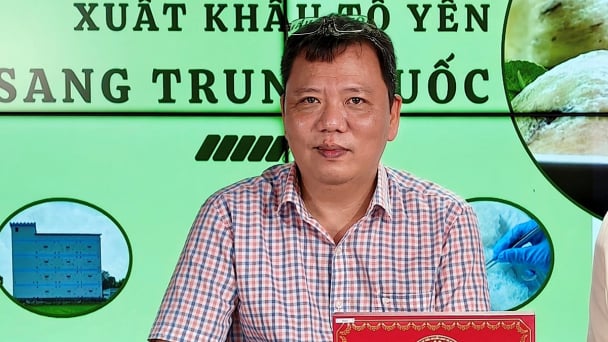
(VAN) A multi-channel, multi-directional strategy only works when the agricultural value chain meets global transparency and SPS standards.
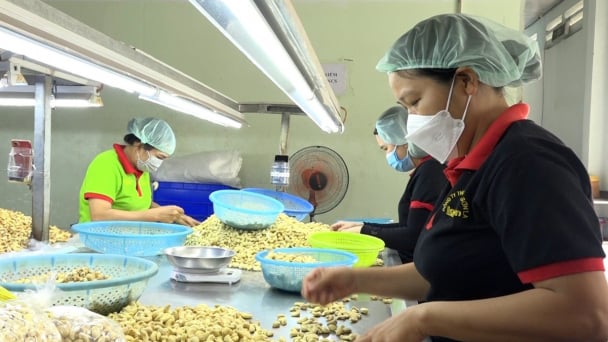
(VAN) Market expansion is a matter of survival for Vietnamese businesses amid fierce competition and global supply chain fluctuations.
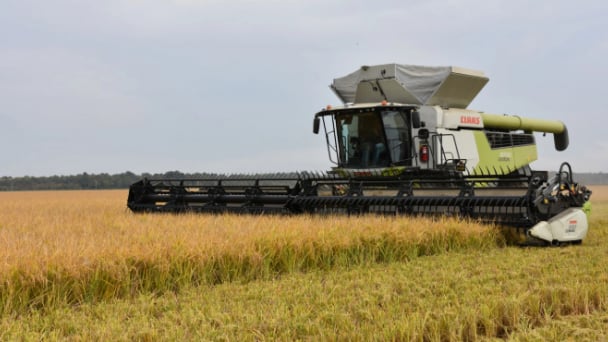
(VAN) Global market prospects for U.S. long-grain rice for the upcoming marketing year.
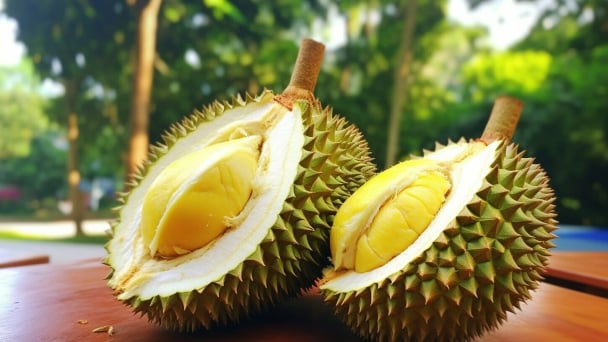
(VAN) China’s General Administration of Customs started permitting fresh durian shipments from Cambodia after a phytosanitary protocol was signed with the Cambodian Ministry of Agriculture in late April.
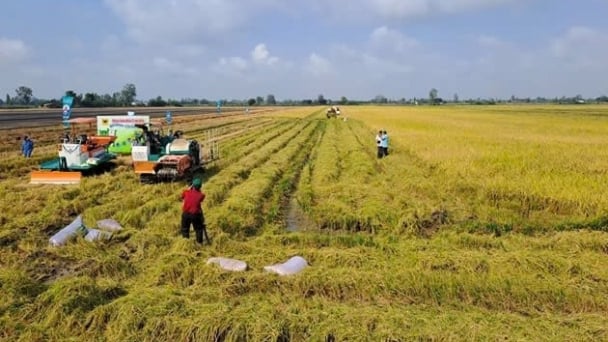
(VAN) To operate carbon market, one of the key issues is determining which types of 'commodities' meet the standards to be traded on the market.
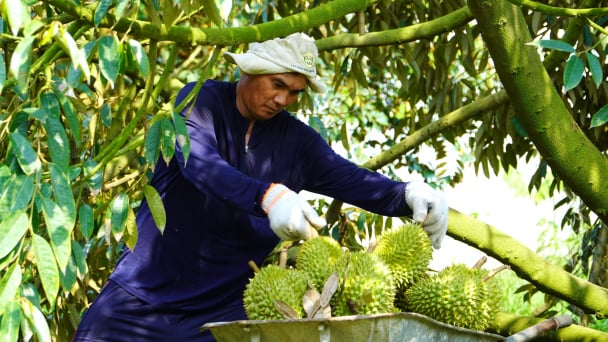
(VAN) Durian-producing localities need to coordinate more effectively with central authorities to improve the traceability, monitoring, and response systems in case of violations.